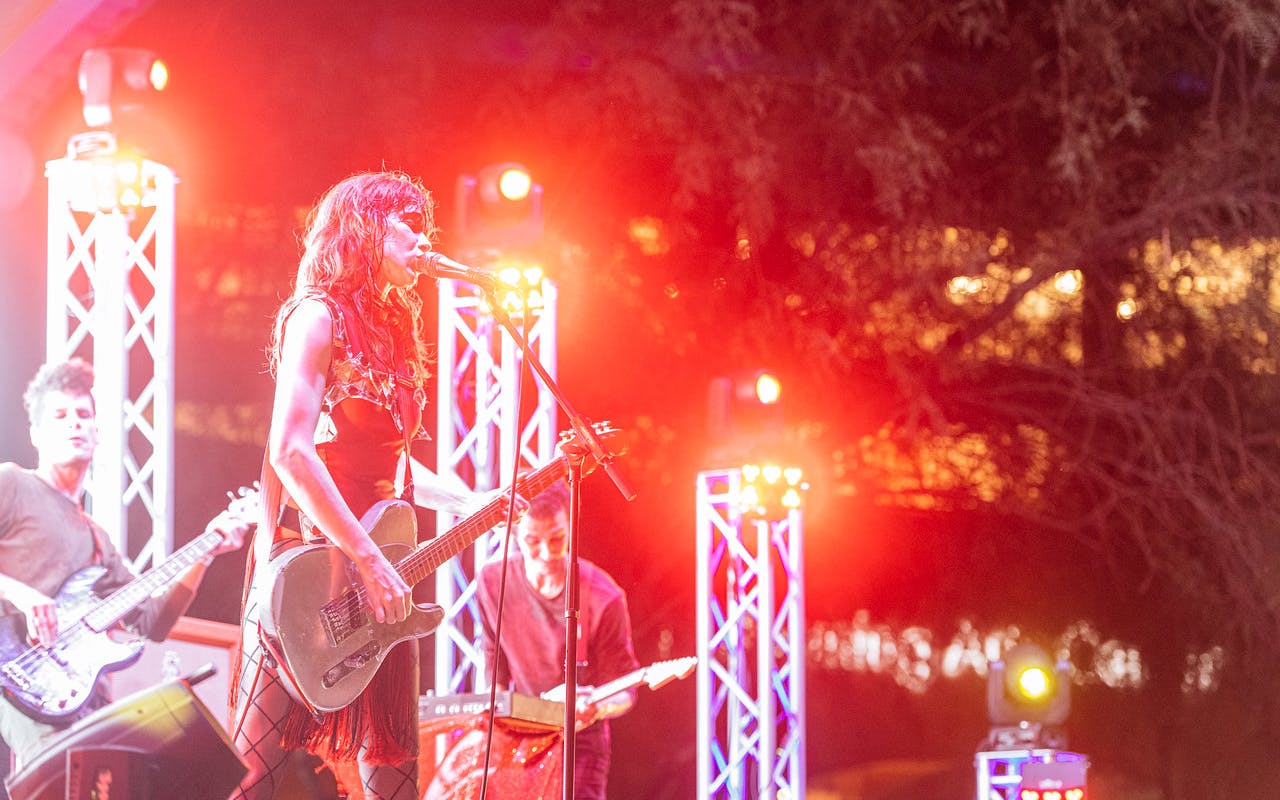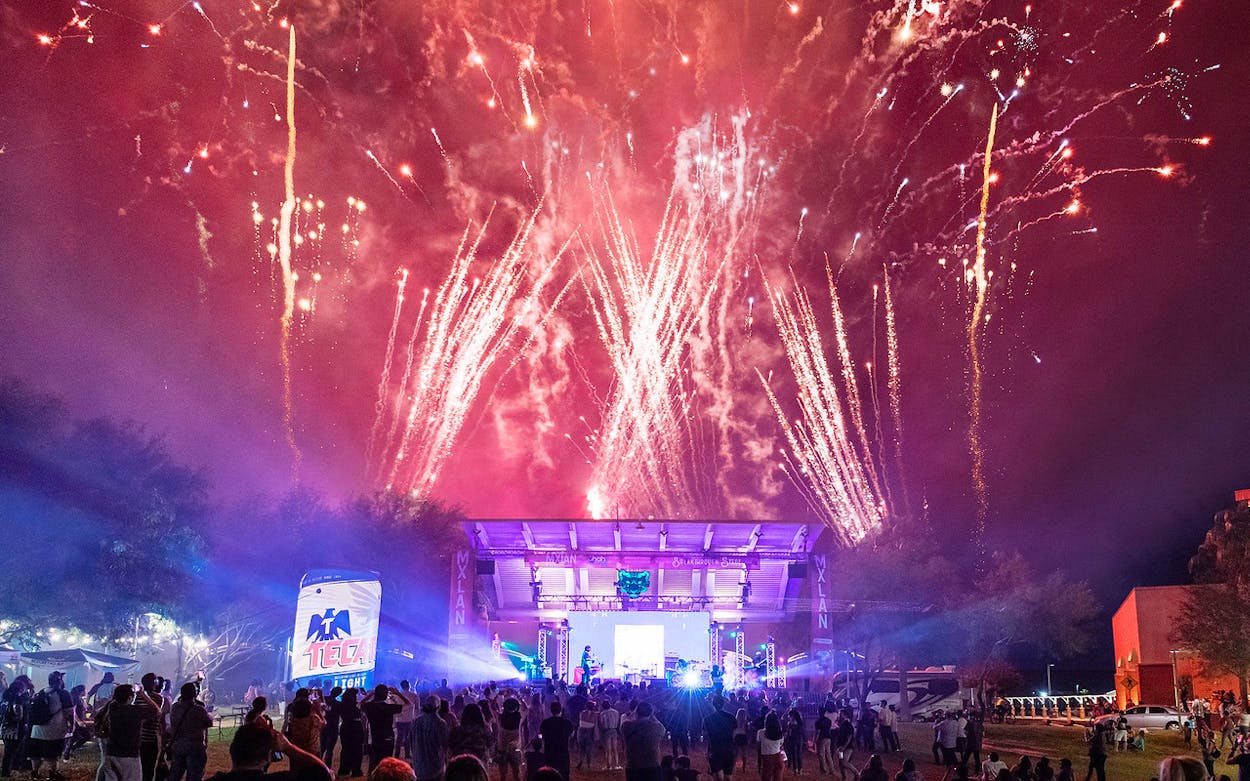On most evenings, the only souls strolling around McAllen’s Oval Park are couples on dates. It’s so quiet, you can hear the distant waterfall in front of the Convention Center—located a football field away. But over five days in late July, the throttling rhythms of indie rock, cumbia, heavy post-progressive rock, hip-hop, and neo-soul flitted throughout the serene outdoor space, intermingling with the smells of open-fire grilled cabrítos, spiropapas, and icy Tecates.
The sensory overload is courtesy of the arts and culture festival MXLAN, whose name stems from “Mexico,” “McAllen,” and “Aztlán”—the latter representing the legendary homeland of the Aztec people, thought to have stretched from deep within what’s now known as Mexico to beyond the Rio Grande Valley (into what is deemed South Texas these days). Along with an extensive food festival and a dance troupe leading a Calenda-style parade from La Guelaguetza (an indigenous ceremonial celebration that happens once a year in Oaxaca), MXLAN also featured local and internationally acclaimed musicians at the outdoor Breakthrough Stage. (Disclaimer: Texas Monthly hosted a panel on border issues at MXLAN.)
Tiger’s Blood, the leading booking agency for independent music in the Rio Grande Valley, curated the Breakthrough Stage’s first two days. Led by local show promoter Patrick Garcia, Tiger’s Blood has helped cultivate the Valley’s music scene for the last decade by providing regular opportunities for aspiring musicians to play shows alongside established touring acts. Over those two days, the neo-soul heartthrob Omar Apollo, the explosive Mexican punk rock band Le Butcherettes, and the beloved (formerly local, now Dallas-based) band Dezorah headlined—sharing bills with local bands that had yet to experience playing on a stage of this size, with a production budget to match. The MXLAN Festival is not only the largest interactive arts event to ever take place in the Rio Grande Valley, it’s also the biggest of its kind to center around a narrative of Mexican culture and its influence. Yet the fact that the Breakthrough Stage was both free and accessible for fans of all ages (during a festival that required a paid ticket for many of its main events) is perhaps one of the most significant contributions that it could make to supporting and sustaining the local community.
Take a band like Yruama, one of the most exciting up-and-coming acts in the Valley rock scene today. They have yet to tour nationally and expand their audience beyond South Texas but were able to play for people who had never heard them before—and who may not have taken them as seriously had they been playing anywhere else. This was not someone’s humid living room, nor was it a typical venue show. For the first time, the band’s high-energy anthems such as “Mexican Modern Art” or the tender unreleased single “Ghost” blasted from a massive, festival-grade sound system—not some busted PA. It’s something people will likely remember the next time they think about local music.
Before a citywide festival like MXLAN entered the local creative ecosystem, bands in McAllen—and the Valley—would have to go years before coming across something like this. Not for a lack of trying, but due to a lack of resources. The average entry fee to a local show hovers around five dollars, and the typical headcount ranges from thirty to fifty people. The earnings of $250 or so are typically split among the bands, a sound engineer, and other support staff (door, merch, security, etc.). This sends traveling artists off with barely enough money to cover gas, and leaves local musicians with little more after they’ve bought themselves a meal or a round of drinks. If you’re promoting this show, you get to go home with the satisfaction that you put together a positive experience for the bands and attendees, and hope they’ll be motivated to form groups of their own and contribute to the scene. Right now it’s impossible to lead any type of creative lifestyle in the RGV if you’re only motivated by money—not only does the well run dry, but it’s also not very deep to begin with.
While most creatives have day jobs that support their ambitions, businesses that help scenes thrive, including venues and record stores, have struggled to survive in recent years. Fall Back Records, a label, record store, and music venue in McAllen, closed its doors in December 2013. B.A.M. (Brownsville Artists and Musicians), a vibrant warehouse space in downtown Brownsville that often hosted radical art shows, activism, and performances by local and touring bands, shuttered in December 2016 after just two years. The Prelude, a welcoming cafe and venue space in Harlingen that catered to singer-songwriters, was forced to shut down in May 2018 after being open for four years; it then became Corsi’s Guitars, a music store. (After suffering severe flooding in a recent storm surge, it appears to have closed its doors for good.) In the absence of dedicated venue spaces, bands and promoters alike have opted for performances at people’s houses instead, which can be a tenuous prospect of its own.
Whether by design or by circumstance, the independent music and arts communities of the Rio Grande Valley have consistently struggled to sustain themselves. However, this means people are scrappy, jumping at every opportunity to uplift themselves and hoping every good turn welcomes another. Each new generation brings new people, who—thanks in part to the internet—are now no longer so disconnected from those that came before them and are learning from their mistakes. Over the last ten years in particular, these communities have continued to grow in spite of these hurdles, becoming better prepared for future challenges and opportunities alike.

MXLAN’s origin, meanwhile, has both economic and cultural motivations behind it. Eighteen months ago, if you were on the board of the McAllen Chamber of Commerce—or worked in retail—you probably noticed a sharp downturn in cars with Mexican license plates around town. Following waves of antagonistic rhetoric from the current administration, many Mexican citizens who normally crossed the border to shop in Rio Grande Valley towns stopped doing so. Some made the decision out of protest, but others feared for their safety while traveling throughout the border region.
The Chamber then set out to put together an event that would accomplish several things: drive hotel occupancy and retail sales, promote the city’s growing culinary scene, and reaffirm the borderland’s connection with Mexico. Through a partnership with local advertising agency PolluxCastor, they came up with an idea to host an interactive arts and music festival at the McAllen Convention Center and surrounding grounds. “We want it to appeal to a very broad cross-section of folks, so we wanted to make sure we had things that a wide variety of people would want to participate in and want to be a part of,” says Steve Ahlenius, president and CEO of the McAllen Chamber of Commerce.
By opening up the Breakthrough stage to promising local artists, MXLAN could help talented creatives level up in their careers, possibly for the first time. “Seeing something this big and this great in McAllen is incredible,” says Danica Salazar, vocalist and guitarist in Dezorah. “I hope it grows and keeps getting bigger and bigger, and this is just the beginning, so it’s really awesome.” By keeping the stage free of charge and open to all ages, the festival also provides fans of live music in McAllen as well as the Rio Grande Valley of any age or economic background with a chance to engage with something in their own communities that even local arena venues, such as Edinburg’s Bert Ogden Arena and Hidalgo’s State Farm Arena, don’t currently provide.
This challenges one of the biggest misconceptions about the Rio Grande Valley, spread by its own residents: that it is always missing something, or is less than. “I think that something that has happened in the past [is] a lot of people have this idea that for things to be great in the Valley that things have to come from outside of the Valley,” says Rubén Cantu, a local poet and community member. “The Valley is an abundance of cultural wealth of all aspects, all creative outlets, all creative expressions—we have poets, writers, painters, musicians, vocalists of all sorts. There’s just so much of it here, so to see it get tapped into and put on such a large platform is amazing.”
While watching the performances at the Breakthrough Stage this past weekend, I noticed a particular connection between artists and the festival’s present and future. For instance, Le Butcherettes’ Teri Gender Bender rocked out directly at an equally frenetic five-year-old, sitting on his father’s shoulders in the front row. And Beatriz Montejano, a.k.a. DJ QueenKillahBee, was emboldened by the young girls in the audience watching her perform. “It’s definitely really heartwarming to see the city of McAllen hosting this—not only for like us musicians, but in general for everybody,” Montejano says. “Compared to DIY it’s a bigger scale, and it just feels more professional … it kind of gives that attitude of, ‘I can do this.’”
One of the slogans that adorned MXLAN merchandise felt appropriate after these shows: “These are the roots, and we are the flowers.” With many new and rising artists eager to make a name for themselves, the festival stands to become a pathway for local acts to build a larger presence in their communities and eventually return as headliners, drawing in audiences and building a next generation of artists at once. If done thoughtfully, local music and arts scenes could grow outside of the festival, in turn helping local businesses that support those communities, and ensuring the scene’s sustainability.
At times, MXLAN felt a bit tokenizing of Mexico’s indigenous cultures—but nonetheless managed to draw thousands of people for all five days, which is no small feat. If this year’s festival could be considered a root, there’s much to look forward to when next year’s blooms.






